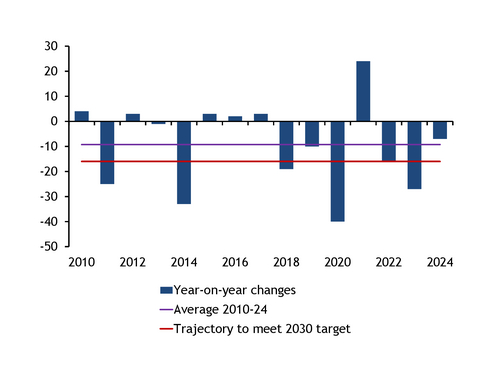The pace of emissions reductions in France last year was "incompatible" with its goal of reaching net zero greenhouse gas (GHG) emissions by 2050, according to state climate watchdog Haut Conseil pour le Climat (HCC).
Gross GHG emissions fell by 7mn t/CO2 equivalent (CO2e) last year to 369mn t CO2e, a step down from the decline of 27mn t recorded a year earlier. Gross emissions last year were 32pc below the 1990 level, compared with a target of a 50pc decline, or down to 270mn t, by 2030. France's upcoming emissions plan, set to be published this year, aims at a 16mn t/yr fall in emissions to 2030.
About 70pc of the decline last year was linked to temporary factors, leaving only a 2mn t structural reduction, HCC said. Emissions from private vehicles — one of the largest sub-sectors, accounting for 18pc of emissions — stagnated despite the slow ongoing electrification of the fleet, suggesting an increase in the distances travelled.
Lower emissions from buildings were almost entirely attributable to weather and higher energy prices, while a slowdown in the decline of industrial emissions was not linked to any uptick in production.
And public policies to deliver decarbonisation are lacking, with a "relaunch" being necessary to meet objectives.
Overarching plans have been delayed, HCC said, citing the SNBC emissions plan and PPE energy plan, both of which are expected to come out this year.
Some policies have been put in place to contribute to decarbonisation, including regulations on vehicle fleet emissions and taxes on air travel. But progress has slowed or reversed in other areas, such as domestic energy efficiency programmes. And the decreased funding to two sub-sectors that require the majority of investment needed to reach 2030 targets — energy efficiency improvements to homes and electric vehicles — makes meeting these targets "unlikely" without considerable acceleration, HCC said.
The slowdown in French emissions cuts comes at a crucial moment in the UN-run international climate process. The UN Cop 30 conference planned for Belem, Brazil, in November will mark the 10th anniversary of the Paris agreement, in which states committed to maintaining global temperature increases to well below 2°C, and preferably 1.5°C.
In the run-up to the conference, countries and blocs should deliver their third nationally determined contributions (NDCs), or climate plans, outlining their efforts to cut emissions. But these plans are likely to fall short of the cuts necessary to keep the 1.5°C temperature limit, reinforced at Cop 28, within reach.
France should work with the EU to ensure strong language on the phase-out of fossil fuels is present in Cop 30 outcomes, HCC said. But the country's own lack of a detailed fossil fuel exit plan, as well as declines in its provision of climate finance, could decredibilise its climate diplomacy, HCC warned.
The European Commission on 2 July proposed an emissions reduction target of 90pc by 2040, which if extrapolated on a straight line would lead to a 73pc cut for 2035 in the NDC, according to non-governmental organisation WWF.



